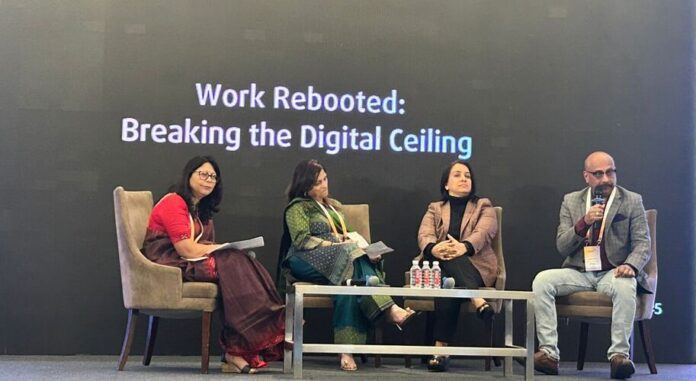At TalentNomics India’s 10th Annual Global Leadership Conference themed “Power. Pixel. Parity: Equity in the Age of Automation”, leaders from technology, investment, and digital innovation came together to explore the future of work in an AI-driven world. The event aimed at envisioning an Equiverse, a world where equity is central to innovation and technological progress.
The fireside chat titled “Work Rebooted: Breaking the Digital Ceiling” was moderated by Lata Singh, Independent Consultant and Advisor, and Former Partner, IBM. The panel featured Jagdish Mitra, Founder and Chief Executive Officer, HumanizeTech.AI; Shalaka Verma, Head of Customer Engineering, Google India; and Dr. Archana Hingorani, Founder and Managing Partner, Siana Capital.
Opening the discussion, Lata Singh said, “We are going to challenge the assumption that technological advancements automatically lead to equitable workplaces. It is critical to examine how automation impacts jobs, skills, and the career trajectories of women and what intentional design must be incorporated to mitigate unintended consequences.”
AI, Task Disruption, and the Changing Nature of Work
Addressing the impact of AI on employment, Jagdish Mitra stressed that the transformation to come is both urgent and inevitable. “I strongly believe that all our roles, irrespective of seniority, will significantly change in the next three to five years. More than 30 percent of jobs in India are expected to be redesigned or displaced because of AI, and over 50 percent of those affected will be women, given the tasks they predominantly perform.”
Also read: Tech Achieve Media Hosts CXO Roundtable on Quantum-Resilient Cybersecurity in BFSI Sector
Mitra emphasized the need to shift from job-based assessments to task-based workforce readiness, noting: “If we do not evaluate the tasks that define our roles, we may be caught on the wrong foot. Small tasks will disappear quietly, and one morning we will realise that 30 percent of what we do is no longer needed.”
Highlighting corporate responsibility and policy interventions, he added,
“Reskilling cannot be an HR exercise alone. Business and HR must jointly redesign roles and put in place structured learning pathways. There are global examples worth emulating, and it is time we move from token diversity to measurable impact.”
Bias, Opportunity, and Rebuilding Careers with AI
Sharing her perspective on women’s careers in AI and automation, Shalaka Verma noted both the risks and opportunities emerging in the industry. “AI will disrupt every job, every role, and every task. The early wave of displacement is seen in repetitive cognitive roles that are largely held by women. It appears unfair, but it is also an opportunity to reposition careers at higher value levels.”
Verma acknowledged that the first wave of automation is affecting job profiles dominated by women due to repetitive cognitive responsibilities. However, she framed this disruption as a chance to reset trajectories: “Because we are getting hit first, we are waking up earlier and hence we have a higher chance of reprimanding ourselves. I would rather say it’s a good opportunity.”
She stressed the need for women to move beyond fear and claim spaces in emerging industries. “Instead of fighting for a share of an existing pie, we should focus on expanding the pie. Agriculture, healthcare, financial inclusion, and e-commerce are sectors poised for massive growth, and women must skill themselves to play leadership roles in shaping that future.”
Explaining the three evolving skill domains, she said, “There will be builders of AI, users of AI, and maintainers of AI. Each of us has a natural place in this landscape. The advantage today is that knowledge is democratised. If you have a device and internet, you can learn anything.” Verma concluded with a thought from literature that resonated deeply with the audience: “It takes something more than intelligence to act intelligently. This is our moment to act.”
Funding Gaps and the Investment Lens in Women-Led Startups
Turning to structural barriers faced by women entrepreneurs, Dr. Archana Hingorani addressed the persistent gender gap in venture funding: “Every fund manager has a different investment thesis, and while the intent to invest in women-founded companies exists, the available pipeline in specific sectors does not always align. The sample size of women founders in deep-tech and non-traditional sectors is still limited.”
She added, “The statistic that only two percent of venture capital goes to women-led companies is concerning, but context matters. In my portfolio of eight companies, two are women-led because those were the sectors where I could find them. We must build a stronger pipeline rather than rely on tokenism.”
Calling for systemic change, she noted, “We often say we want more women founders, but we must also ask whether we are preparing women with the right networks, sector exposure, and risk-friendly environments to step into these opportunities.”
Towards an Equiverse
In closing the session, Lata Singh reinforced the shared responsibility in shaping the future of work: “There will be disruption, but the question is how we prepare to rise higher rather than fear replacement. Equity must be designed into technology, policy, and leadership, not expected as an afterthought.” The conversation emphasised that the future of work will not be automated or equitable by default, but must be intentionally built through reskilling, inclusive design, and equitable investment practices.







